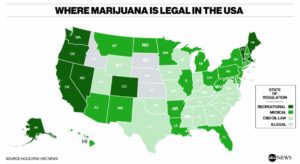 By Andy Lyman, NM Political Report
By Andy Lyman, NM Political Report
The 2020 legislative session starts tomorrow and besides the standard 30-day budgetary issues, many eyes are on cannabis and whether this is the year it becomes legal to use recreationally. Last week, two lawmakers filed bills aimed doing just that. Rep. Javier Martinez and Sen. Gerald Ortiz y Pino, both Albuquerque Democrats, are cosponsors of the Senate version of the Cannabis Regulation Act. Martinez is the sponsor of the House version of the bill.
The bills are largely based on recommendations from a legalization work group and a legalization bill that failed to get to the governor’s desk last year. Both bills are 175 pages long and prescribe how recreational should be taxed, age limits for possessing or consuming cannabis and which state entities will be involved. Gov. Michelle Lujan Grisham announced last year that she would support a comprehensive legalization bill and added to “the call” this year. It is nearly unheard of for legislation to make it to the governor’s desk without some amendments, so these two bills will likely change in the next 30 days, but here are some key points of the bills.
Possible Heartburn
Various different lawmakers have tried to pass recreational legalization bills over the years, but 2019 marked the farthest in the process a proposal made it in recent history. The sticking point last year for legalization was the Senate, where, despite a Democratic majority, a handful of Democrats who adamantly oppose full legalization. In addition to lawmakers who oppose legalization, committee hearings on the issue will also likely include medical cannabis patients and advocates speaking out against these proposals. During a medical cannabis rule change hearing last week, a medical cannabis producer warned against the Medical Cannabis Program leaving the Department of Health.
Martinez told NM Political Report that even though some responsibilities and duties will be moved to other state departments under his bill, his intention is to ensure social equity and that cannabis patients have enough affordable medicine. “There’s a lot of misinformation about how this is going to hurt patients and hurt the medical program,” Martinez said. “There are two foundational principles to our bill: to protect, enhance and improve the medical program for patients and to achieve a different level of equity for communities that have been impacted by the war on drugs, including black communities, Native American communities, Latino communities and others.” Martinez said any amendments that take those two things away, would make the bill a “non-starter.” “If any of those two foundational principles are messed with or watered down in any way shape or form, this thing’s not going to pass, and that’s coming from the sponsor,” Martinez said.
Bill Highlights
- Adults over 21 can have up to 2 ounces flower or 16 grams of extract.
- Medical cannabis patients would still have no possession limits, but they can only purchase up to 8 ounces of dried flower or bud within a rolling 3-month period.
- Only medical cannabis patients who hold a Personal Production License (PPL) can grow their own cannabis. Anyone found to be growing up to three plants without a PPL could face a $50 fine. Anyone found to be growing more than three plants without a PPL could face a fourth degree felony, which comes with up to 18 month in jail.
- Recreational sales would include a nine percent state tax and would give counties and municipalities the option to add an additional four percent tax.
- Automatic expungements for those who are incarcerated for drug charges that would become out of date.
Some Cleanup
Besides legalization, lawmakers will have a chance to weigh-in on who should get to be a medical cannabis patient in New Mexico. In 2019, the Legislature passed major changes to the Lynn and Erin Compassionate Use Act including a minor word change that resulted in medical cards being issued to non-residents. Late last year, a judge ruled that defining a qualified patient as a “person” instead of a “resident of New Mexico” meant anyone with a qualified condition can become a medical cannabis patient, regardless of where they primarily live. Ortiz y Pino, who sponsored the bill that made that change, is now taking a cue from Lujan Grisham and adding a clarification. His bill this year has an emergency clause, which would put the law into effect as soon as the governor signs it. The issue of who is qualified to get a medical cannabis card was litigated in court for much of 2019 and the issue is pending in the state Court of Appeals. If Ortiz y Pino’s bill passes, it would likely make the issue in court moot. It is very likely that all issues surrounding cannabis will be heavily debated and trying to pass sweeping changes to a law in 30 days is a big task.
Leave a Reply